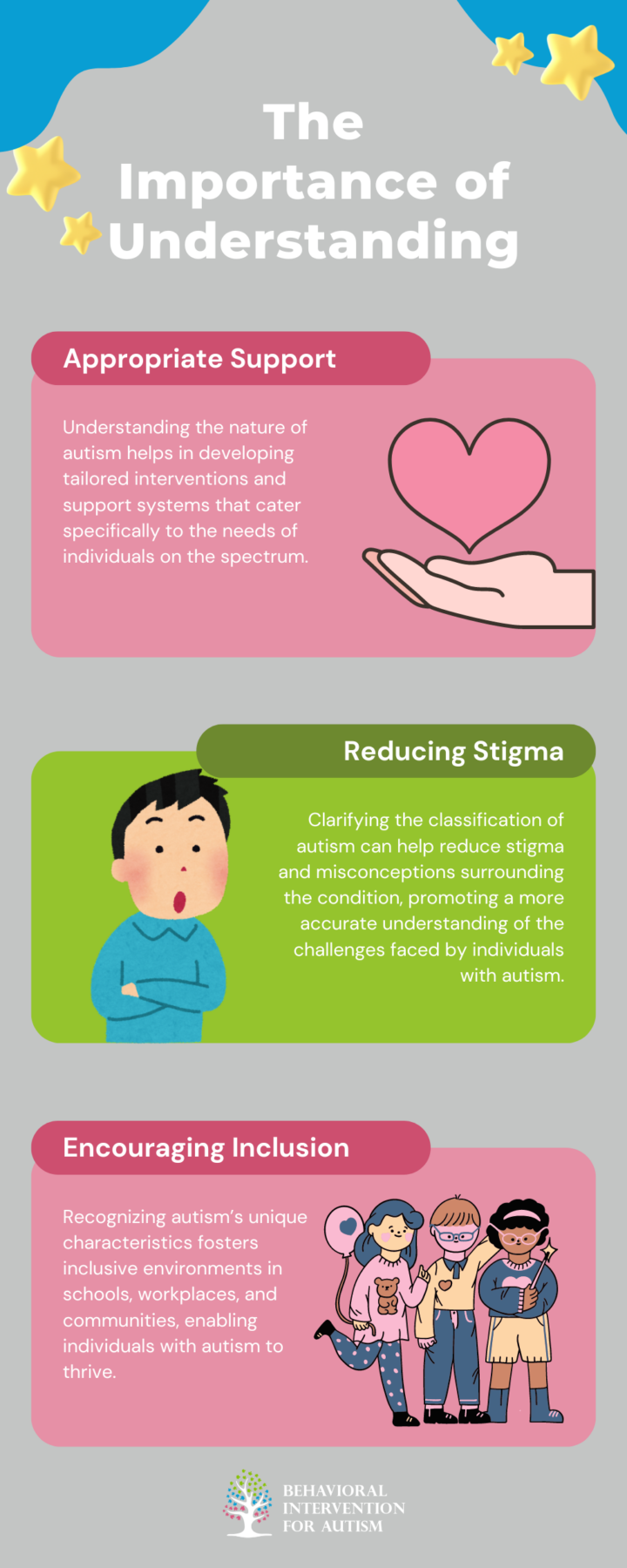
Table of Contents
Delving into the realm of autism, it’s vital to grasp that autism is not a mental health concern but rather a developmental condition that influences how individuals interact with the world and form connections with others. This condition, characterized by neurodiversity, impacts cognitive processes, perceptions, and social interactions, existing along a diverse spectrum.
Is Autism Considered a Mental Disability?
No, autism is not classified as a mental disability but rather as a neurodevelopmental disorder. This distinction is important because it emphasizes that autism is primarily related to differences in brain development and function, affecting how individuals perceive and interact with the world. While autism can present challenges, such as difficulties with social communication and repetitive behaviors, it does not inherently impair cognitive functioning. Many individuals on the autism spectrum possess unique strengths and abilities, often excelling in areas like mathematics, music, or art.
Moreover, viewing autism solely through the lens of disability can overlook the diverse perspectives and contributions of autistic individuals. The neurodiversity movement advocates for recognizing autism as a variation of human experience rather than a disorder that needs to be fixed. This perspective fosters a greater appreciation for the different ways people think and process information, promoting inclusion and support rather than stigmatization. By understanding autism in this context, we can better support individuals on the spectrum and celebrate their unique abilities.
Definitions of Mental Disability
A mental disability typically refers to a condition that significantly impairs an individual’s cognitive, emotional, or social functioning. This category includes a variety of disorders, such as anxiety disorders, schizophrenia, and mood disorders. These conditions are often diagnosed based on specific criteria that assess the individual’s ability to think, communicate, and interact effectively.
Autism as a Developmental Disorder
ASD is primarily classified as a developmental disorder rather than a mental disability. It is characterized by differences in how individuals perceive and interact with the world. Autism manifests in various ways, including difficulties in social communication, restrictive behaviors, and repetitive patterns of interest.
Developmental disorders are typically diagnosed in early childhood and affect various aspects of development, including cognitive, social, and emotional skills. Unlike mental disabilities, which may arise later in life due to environmental or situational factors, developmental disorders like autism are generally recognized as neurobiological conditions present from birth or early childhood.
The Spectrum of Autism
One of the defining features of autism is its spectrum nature, meaning that it affects individuals to varying degrees. Some individuals with autism may require significant support, while others may lead independent lives and excel in various fields. This diversity in functioning further emphasizes that autism should not be viewed solely through the lens of a mental disability.
Common Misconceptions
A common misconception is that autism is synonymous with mental illness or disability. While some individuals with autism may experience co-occurring mental health conditions, such as anxiety or depression, this does not define their experience of autism itself. It’s important to distinguish between autism as a developmental condition and mental illnesses, which often involve mood and thought disturbances.
Diagnosing Autism vs. Misdiagnoses
Evaluating the accurate diagnosis of autism is crucial in understanding the condition and providing appropriate support. However, there are challenges surrounding misdiagnoses that can impact the journey of individuals with autism. Let’s delve into the misdiagnosis challenges and common misdiagnoses seen in autistic children.

Misdiagnosis Challenges
The process of diagnosing autism can be complex, especially in cases where individuals exhibit overlapping behaviors with other mental health conditions. Misdiagnosis poses a significant challenge, delaying the identification and intervention for autism. It can lead to misconceptions about the individual’s needs and hinder the implementation of targeted therapies and support systems.
To combat misdiagnosis challenges, it is essential for healthcare professionals to undergo specialized training in recognizing the nuances of autism spectrum disorder (ASD). Additionally, ongoing research and advancements in diagnostic tools can contribute to more accurate and timely diagnoses, reducing the likelihood of misdiagnoses.
Common Misdiagnoses in Autistic Children
Children with autism, especially those who are verbal and exhibit average intelligence, are susceptible to receiving misdiagnoses before being accurately diagnosed with autism. This is often due to the overlapping behavior traits between autism and other mental health disorders. Some common misdiagnoses that autistic children may encounter include:
Misdiagnosis | Description |
Obsessive-Compulsive Disorder (OCD) | Repetitive behaviors and routines in autism can be mistaken for OCD symptoms. However, the underlying motivations and characteristics of these behaviors differ between the two conditions. |
Narcissistic Personality Disorder | Challenges in social interactions and communication skills in autism may lead to a misdiagnosis of narcissistic personality disorder. Understanding the underlying reasons for these behaviors is crucial for accurate diagnosis. |
Oppositional Defiant Disorder (ODD) | Behavioral issues and defiance commonly observed in autism can sometimes be misinterpreted as oppositional defiant disorder. It is essential to consider the broader context of the individual’s behavior to avoid misdiagnosis. |
Recognizing these common misdiagnoses and understanding the distinct features of autism can aid in improving diagnostic accuracy and ensuring individuals receive the appropriate support and interventions tailored to their needs. By addressing misdiagnosis challenges and promoting awareness among healthcare professionals and caregivers, the journey of individuals with autism towards accurate diagnosis and effective support can be enhanced.
The Importance of Understanding
Recognizing autism as a developmental disorder rather than a mental disability is crucial for several reasons:

Autism spectrum disorder is a developmental disorder, not a mental disability. Although individuals with autism may encounter mental health challenges, these do not diminish the unique characteristics of the condition. By recognizing autism as a developmental issue, we can provide appropriate support, reduce stigma, and foster inclusivity, allowing individuals with autism to flourish. Embracing neurodiversity is essential, and it’s crucial to appreciate the distinct strengths and challenges that come with autism.
Behavioral Intervention for Autism offers exceptional ABA therapy in Florida, tailored to meet the specific needs of each individual. Our dedicated team is passionate about creating effective strategies that empower individuals to reach their full potential. If you want to learn more about how we can help, feel free to connect with us today!
- 9 Common Obsessions of Children With Autism You Should Know - February 25, 2025
- What is Neurodiversity? A Guide to Embracing Differences - February 25, 2025
- Understanding Hyperfocus in Autism: What It Means and Why It Happens - February 25, 2025
